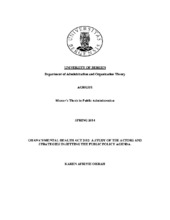Ghana's mental health act 2012- A study of the actors and strategies in setting the public policy agenda.
Master thesis
Permanent lenke
https://hdl.handle.net/1956/8350Utgivelsesdato
2014-05-26Metadata
Vis full innførselSamlinger
- Department of Government [457]
Sammendrag
The mental health bill was drafted in 2004 but was eventually passed in 2012 after some pressure was put on government to pass the law in order to improve access to mental health care. This study attempted to investigate the actors who spearheaded the passage of the law and to analyse the strategies used by the actors to set the agenda and get the act passed. The study sought to find out how domestic actors in policy making were able to get the issue of the poor state of mental health care in Ghana to the table of government. This is because the mental health sector had been neglected by government who for several years had provided woefully inadequate budgetary allocation to the sector. Also due to negative public perception of mental illness, public support for issue on mental health was below expectation compared to other health matters. The study used Kingdon's agenda setting model- Multiple streams framework to understand and explain the agenda setting of the mental health act. Findings from the research showed that all the actors played important roles in putting the issue of the poor state of mental health care and treatment on the agenda of government and eventually ensured that the mental health law 2012, Act 846 was passed. The study showed the significant role played by domestic actors especially NGOs who used their resources and took advantage of policy windows to push their proposals. Also, the study showed the interplay of politics in agenda setting.
